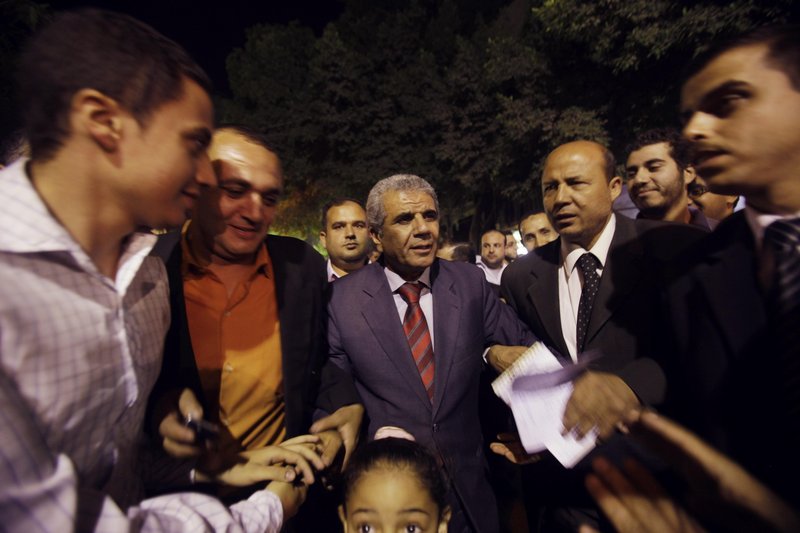CAIRO – The night breeze blew foul wafts from a nearby canal black with garbage and pollution.
It was to Cairo’s slum of Munib on a recent evening that the Muslim Brotherhood, Egypt’s biggest Islamic group, brought its election campaign message: The country must turn to Islam to rebuild.
“Muslims around the world expect great things from you,” Essam el-Erian, deputy head of the Brotherhood’s new political party, told supporters crowded into a tent, with men across the aisle from women in headscarves or black veils. “We have to build a nation of freedom and equality, a nation of the true Islam.”
The scene, like many in Egypt now, was inconceivable before President Hosni Mubarak’s Feb. 11 ouster. Under Mubarak’s autocratic regime, the Brotherhood was banned. Tens of thousands of its members were arrested, many tortured, and its gatherings were held largely behind closed doors.
Now, with Mubarak gone, the Brotherhood is storming into the open, appealing to religious voters and trying to win over Egypt’s poor.
It is likely to be part of Egypt’s next government, with a hand not only in ruling but also in writing a new constitution. And its strength has fueled fears among many Egyptians that it will turn what began as a pro-democracy uprising in the Arab world’s most populous nation into Islamic rule.
But the Brotherhood’s own identity is on the line, and there is pressure from inside and out for it not to go down a sharp-right Islamic road.
Internally, Brotherhood moderates — many from a younger generation — are resisting control from hard-line leaders, in a struggle that could fragment the group. And from the outside, a budding democracy is pushing the Brotherhood, at least in public, to present a more liberal face.
How the Brotherhood deals with its new status will be a major test of whether Islamists and democracy can be compatible in the wake of the Middle East’s wave of revolutions. With the Brotherhood involved in protests in Syria, Yemen, Libya and Jordan, the answer here could be a model across the region.
“We’re not ready for power, we don’t have the flexibility,” said Mohammed Osman, a 29-year-old pharmacist who counts himself among the Brotherhood’s new generation. “To go from prison to power, that could be extremely dangerous.”
In one of Cairo’s most prominent mosques, the Brotherhood’s top leader, Mohammed Badie, paused in the combination sermon-campaign speech he was delivering from an ornate niche marking the direction of Islam’s holy city of Mecca. A child next to him, with a green Brotherhood sash across his chest, took the cue to break in with a chant.
“God is great!” the boy piped up. The crowd of more than 1,000 men, seated on the carpets of the Amr ibn al-As Mosque, echoed back, “God is great, God is great!”
“Egypt’s revolution was produced by none other than God Almighty,” Badie resumed. “The days of ‘no religion in politics and no politics in religion’ ended long ago.”
As Egypt races toward its first free and open parliament elections, planned for September, the Brotherhood’s power in the new Egypt comes down to a raw count: How many seats it wins. In this country of 80 million, Egyptians are expected to vote in unprecedented numbers. Their preferences have never been measured before.
The 90-year-old Brotherhood, with its hundreds of thousands of activists, has a leg up on more secular activists scrambling to form parties from scratch. For the first time, it has formed a political party, holding rallies nationwide, from rural towns to urban slums.
It has revved up social services that long helped build its following. In the city of Alexandria, young Brothers clean streets and fill potholes. In Kafr Mit Fatek, a tiny Nile Delta farming village, a traveling clinic of Brotherhood doctors gives families free dental work, checkups and gynecological exams.
In a sign of confidence, the group has opened a prominent new Cairo headquarters in a luxury office building proudly emblazoned with its emblem, crossed swords under a Quran with the word “Prepare.”
Brotherhood leaders say the new Freedom and Justice Party will run for only half of parliament’s seats so it cannot gain a majority — they predict 30 percent to 40 percent. Nor will it field a candidate in November’s presidential election. It is also trying to form coalitions with other parties, including liberals.
El-Erian, the party’s deputy head, says parties must work together for several years to entrench a democratic system.
“Maybe after that, everyone can compete without any problems,” he told The Associated Press.
Send questions/comments to the editors.



Success. Please wait for the page to reload. If the page does not reload within 5 seconds, please refresh the page.
Enter your email and password to access comments.
Hi, to comment on stories you must . This profile is in addition to your subscription and website login.
Already have a commenting profile? .
Invalid username/password.
Please check your email to confirm and complete your registration.
Only subscribers are eligible to post comments. Please subscribe or login first for digital access. Here’s why.
Use the form below to reset your password. When you've submitted your account email, we will send an email with a reset code.